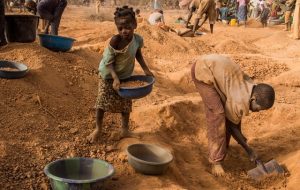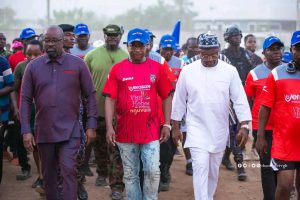Science and engineering providing crucial solutions to satisfy water needs of Windhoek, capital of Namibia
The City of Windhoek employs a circular economy systems approach, focusing on cyclical production and consumption in the management of its water resources. This approach moves away from linear production and consumption, with the main goal of eliminating waste and pollution while ensuring regenerative natural systems.
A section of Windhoek City sits on a natural aquifer, which has enabled the City’s Bulk Water and Waste Water Division to implement circular production and consumption of water.
Namibia has a hot and dry weather with erratic bi-modal rainfall. It is believed that Namibia’s climate is second in aridity only to the Sahara. Namibia river drainage is that such that, she shares several large rivers, such as River Orange in the South, shared with South Africa, as well as River Zambezi and River Okavango in the North, shared with Angola, Zambia and Botswana. But these rivers are far away from the population centers and the cost of tapping them for drinking water supply is prohibitive, as an attempt would be capital intensive.
Windhoek, Namibia’s capital city, is in the dry and hot central highlands with a water demand that far outstrips both conventional water resources such as the rivers, dams and groundwater as well as the non-conventional sources such as water sourced from desalination, managed groundwater recharge and water reclamation resources.
The other solution towards providing water for the City of Windhoek would be to have an inter-basin transfer of fresh water from the bordering perennial rivers or desalinated seawater, these are works in progress.
However, as the population of City of Windhoek continues to grow and the incidence of extreme weather like the droughts becomes more frequent and cyclical, ensuring water security will become a more bigger challenge.
According to Engineer Jacobus Theron, the Section Engineer at the Bulk Water and Waster Water Division, high temperatures which are partly a consequence of climate change, during drought are also leading to high evaporation in the three major dams that supply water to the City of Windhoek including Omatako Dam, Swakoppoort Dam and Von Bach Dam. The three dams are usually filled up with water during the rainy season when the rivers are carrying water.
Eng. Jacobus Theron is well aware of the impacts of climate change on water resources and expresses his fears that the City’s borehole scheme is a finite resource “that must be carefully managed and nurtured so as to remain sustainable,” he said in a recent interview during the 9th Africa Regional Platform for Disaster Risk Reduction (AfRP-9) held in Windhoek, Namibia.
According to Eng. Theron, the City of Windhoek Masterplan has ensured that the water sources for the city are sustainable, water for consumption is assured away from that for industrial use, “every time new councillors come in we have to update them on the importance of ensuring that the aquifer is protected so as to continue providing ground water,” he says.
As the city grows and the population increases, it is a cause for worry, because the rising population needs settlement, the threat of moving towards the fragile ecosystems that are a source of much needed ground water becomes real. “The aquifer area is situated in a place where there can be the least damage,” he says and adds, “it is very important that we maintain this area and there is a moratorium to that effect, that no one will be putting up any structures within the aquifer area, that is what is currently working for us.”
Much of the water is also being sourced from reclamation, which is recycled back into the system after rigorous treatment, “if any of you showered last night or is going to shower today, most probably that water is from reclamation,” says Eng. Theron.
The City of Windhoek, Namibia estimates that its annual water demand is 22.6 million cubic meters. This consumption includes; the city’s industries and central business district (CBD) with the estimated water consumption per capita per day put at around 200 liters.
The city of Windhoek water reclamation turned out to be a very apt way of ensuring that there is sufficient water for a city that is situated in an arid area. While scarcity is the mother of all invention, Windhoek lives under the constant threat of a water shortage, its estimated population of 494,085 people, needs every drop of water. Direct drinking water reclamation from the Goreangab wastewater recycling plant constructed in 1968 came in handy as waste water became an indispensable resource quenching the City of Windhoek.
The multi barrier concept has been refined over many years to the new Goreangab Water Reclamation Plant which was completed in 2002 and comprises the latest available proven water treatment technology ensuring that the quality of water remains high.
Windhoek became the first city in the world to produce drinking water directly from the municipal wastewater, making it one of the cities that can provide case studies for other countries on the African continent that continuously face water shortage and scarcity owing to continuing impacts of climate change.
Windhoek has implemented a Zero Tolerance policy toward water wastage, which includes disconnecting or fining anyone who uses potable water for washing cars or watering gardens. Residents are also encouraged to promptly repair leaks, as a dripping tap can waste hundreds of liters of water.
With climate change leading to extreme droughts becoming a regular part of our weather patterns, Samuel Taylor Coleridge’s poem “The Rime of the Ancient Mariner” resonates: “Water, water everywhere, and not a drop to drink.” We may soon face a situation where slime flows from our homes into rivers and drains, yet we lack clean drinking water. This highlights the urgent need to turn to science and technology for solutions.
The post Science and engineering providing crucial solutions to satisfy water needs of Windhoek, capital of Namibia appeared first on KBC.




